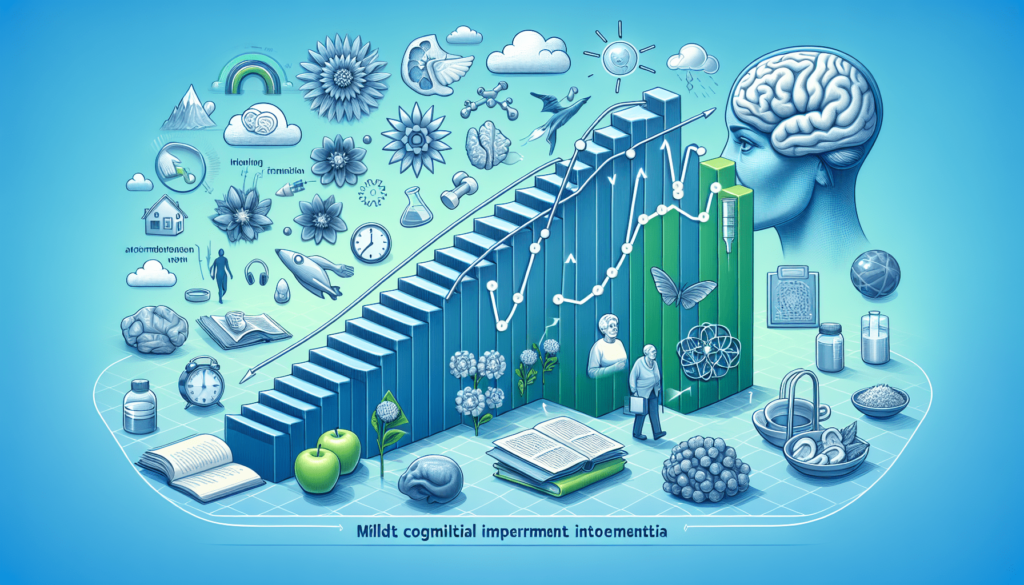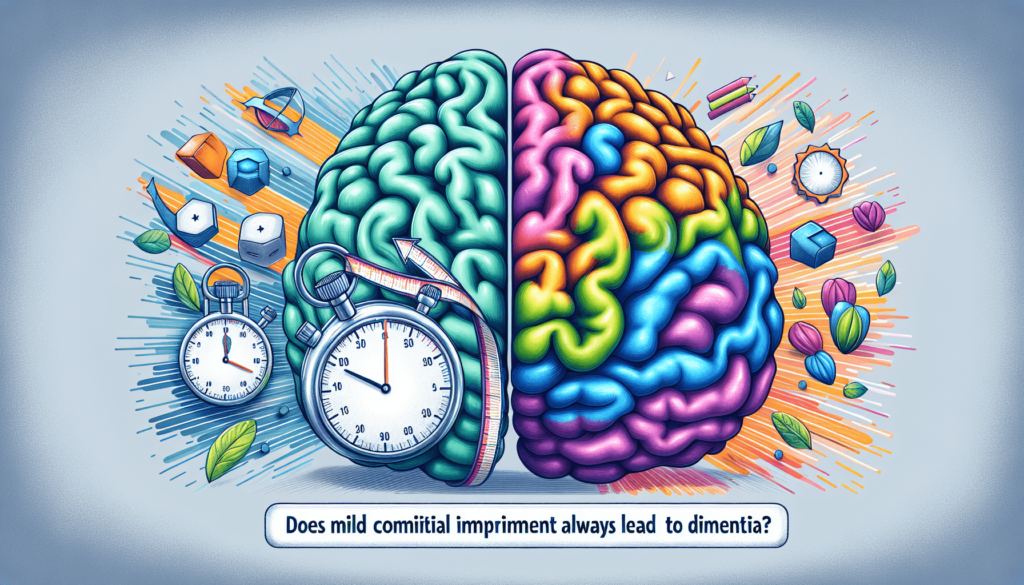In the fascinating world of cognitive health, the question arises: Does mild cognitive impairment always lead to dementia? It's a query that lingers in the minds of many individuals as they navigate through the complexities of aging and memory. Curiosity may spark as we wonder if everyone with mild cognitive impairment is destined to face the challenges and changes that come with dementia. With this in mind, let's venture into the depths of this topic to explore the interplay between mild cognitive impairment and dementia, unraveling the intriguing possibilities and shedding light on the path ahead.

Understanding mild cognitive impairment
Definition of mild cognitive impairment
Mild cognitive impairment (MCI) is a condition that represents a slight decline in cognitive abilities, such as memory, thinking, and language skills, beyond what is considered normal for age-related changes. It is important to note that MCI is not as severe as dementia and does not significantly impact daily functioning. Individuals with MCI may experience some cognitive difficulties but can still carry out their daily activities with minimal assistance.
Symptoms and diagnosis of mild cognitive impairment
The symptoms of MCI can vary from person to person but commonly include forgetfulness, difficulty concentrating or making decisions, challenges with language and communication, and reduced ability to learn and remember new information. It is crucial to distinguish between MCI and the normal cognitive decline associated with aging.
Diagnosing MCI involves a comprehensive evaluation by a healthcare professional. This assessment typically includes a detailed medical history, cognitive tests to assess memory and thinking skills, neurological examination, and often involves input from family members or caregivers. Brain imaging tests, such as magnetic resonance imaging (MRI) or positron emission tomography (PET) scans, may also be conducted to rule out other possible causes.
Factors influencing the onset or progression of mild cognitive impairment
Several factors can influence the onset or progression of MCI. These may include age, genetics, lifestyle, and certain medical conditions. Advanced age is a significant risk factor for developing MCI, as older individuals are more susceptible to age-related cognitive changes. Genetic factors, such as certain gene mutations, can also increase the likelihood of developing MCI.
Additionally, lifestyle choices, such as engaging in regular physical exercise, maintaining a healthy diet, and intellectual stimulation, can play a role in reducing the risk of MCI. Conditions like diabetes, high blood pressure, and cardiovascular disease are known to impact cognitive function and may contribute to the development or progression of MCI.
Exploring the nature of dementia
Defining dementia and its stages
Dementia is a broad term used to describe a set of symptoms associated with significant cognitive decline and impairment in multiple domains, including memory, thinking, communication, and judgment, which affects daily functioning. It is important to note that dementia itself is not a specific disease but rather a syndrome with various underlying causes.
Dementia generally progresses through stages, ranging from mild to severe. The stages are typically categorized as mild, moderate, and severe dementia. In the mild stage, individuals may experience mild memory loss and exhibit difficulty with word retrieval or planning. The moderate stage involves more pronounced memory deficits, challenges with language, and disorientation to time and place. Severe dementia is marked by significant memory loss, language impairment, and a loss of ability to perform basic activities of daily living.
Common symptoms and diagnostic methods for dementia
The symptoms of dementia can include memory loss, confusion, difficulty with language or communication, changes in mood or behavior, and challenges with problem-solving and decision-making. These symptoms can vary depending on the underlying cause of dementia.
Diagnosing dementia involves a comprehensive evaluation by a healthcare professional. Similar to MCI, a detailed medical history, cognitive tests, neurological examination, and brain imaging may be employed to determine the cause and stage of dementia. Blood tests and neuropsychological testing may also be conducted to further assess cognitive function and rule out other possible conditions.
Distinguishing between different types of dementia like Alzheimer's, vascular dementia, etc.
There are several types of dementia, each with distinct characteristics and causes. Alzheimer's disease is the most common form of dementia and is characterized by the accumulation of abnormal protein plaques and tangles in the brain. Vascular dementia, on the other hand, is caused by reduced blood flow to the brain, often due to a series of small strokes or damage to blood vessels. Other types of dementia include Parkinson's disease dementia, Lewy body dementia, and frontotemporal dementia.
Differentiating between these types of dementia is crucial for determining the appropriate treatment approach. A thorough evaluation of symptoms, medical history, and diagnostic tests can help healthcare professionals identify the specific type of dementia affecting an individual.
The link between mild cognitive impairment and dementia
Investigating the potential relation between mild cognitive impairment and dementia
The relationship between MCI and dementia has been extensively studied by researchers. MCI is considered a potential precursor or transitional stage between normal cognitive aging and dementia. While not all individuals with MCI will progress to dementia, studies suggest that MCI increases the risk of developing dementia, particularly Alzheimer's disease.
Outline of studies that have shown a direct link
Numerous studies have demonstrated a direct link between MCI and the subsequent development of dementia. For example, a longitudinal study conducted over a ten-year period showed that individuals diagnosed with MCI at baseline had a significantly higher risk of progressing to dementia compared to cognitively healthy individuals.
Additionally, brain imaging studies have provided evidence of structural and functional changes in the brains of individuals with MCI that are similar to those observed in individuals with dementia. These findings further support the notion that MCI shares underlying pathological processes with dementia.
Outline of studies that contradict or challenge this link
While the majority of studies support the association between MCI and dementia, there are some conflicting findings. Some studies suggest that not all individuals with MCI will progress to dementia, and a certain proportion may even experience a reversal of cognitive decline. These studies underscore the heterogeneity of MCI and highlight the need for further research to better understand the various outcomes associated with MCI.
Risk factors contributing to transition from mild cognitive impairment to dementia
Genetic factors and their impact
Genetic factors play a role in the transition from MCI to dementia. Certain gene mutations, such as the APOE ε4 allele, have been identified as significant risk factors for both MCI and Alzheimer's disease. Individuals carrying this particular genetic variation are more likely to progress from MCI to dementia.
Lifestyle and health habits
Lifestyle factors can also impact the progression from MCI to dementia. Engaging in regular physical exercise, maintaining a healthy diet, and participating in mentally stimulating activities have been shown to reduce the risk of cognitive decline and dementia. Conversely, factors such as smoking, excessive alcohol consumption, and sedentary behavior may increase the risk of progression.
The role of age and gender in the progression
Age is a significant risk factor for the progression from MCI to dementia. As individuals age, the likelihood of developing dementia increases. Additionally, gender may influence the progression, as some studies suggest that women with MCI have a higher risk of developing dementia compared to men. However, further research is needed to fully understand the relationship between age, gender, and the progression of MCI to dementia.

Signs that mild cognitive impairment may progress into dementia
Cognitive changes and their indications
One of the key signs that MCI may progress to dementia is a decline in cognitive abilities. This decline can manifest as increased forgetfulness, difficulty with problem-solving or decision-making, decreased attention span, and problems with language or communication. These cognitive changes may become more pronounced over time and impact an individual's daily functioning.
The role of memory loss in predicting dementia
Memory loss is often a hallmark symptom of dementia and may also be an indicator of potential progression from MCI. Individuals with MCI may experience more significant memory impairments compared to those without cognitive impairment. However, it is important to note that not all individuals with MCI and memory problems will develop dementia, as memory loss can also be influenced by other factors, such as stress or medication side effects.
Behavioral indicators suggesting potential progression to dementia
Changes in behavior and mood can also provide clues about the potential progression from MCI to dementia. These changes may include increased irritability, apathy, social withdrawal, or difficulty with managing daily activities. If these behavioral indicators become more frequent or severe, it is important to consult with a healthcare professional for further evaluation and guidance.
Preventive steps to halt the progression from mild cognitive impairment to dementia
Importance of early detection and intervention
Early detection and intervention are crucial in managing MCI and potentially delaying or preventing the progression to dementia. Regular cognitive assessments and medical check-ups can help identify cognitive changes at an early stage. Prompt intervention strategies, such as cognitive rehabilitation programs, can be implemented to address specific cognitive deficits and promote cognitive functioning.
Lifestyle changes and exercises to delay progression
Modifying lifestyle habits can also play a role in delaying the progression from MCI to dementia. Engaging in regular physical exercise, maintaining a healthy and balanced diet, getting adequate sleep, and participating in mentally stimulating activities can help support brain health and reduce the risk of cognitive decline.
Medication and treatment strategies
While there is currently no cure for dementia, certain medications may be prescribed to manage symptoms and slow down cognitive decline. These medications include cholinesterase inhibitors, which can help with memory and thinking, and memantine, which helps regulate neurotransmitters in the brain. Additionally, treatment strategies may involve addressing any underlying medical conditions, optimizing medications, and providing supportive care to improve the quality of life for individuals with MCI or dementia.

Medical Therapies and interventions
Available drug therapies for dementia
Several drug therapies are available to help manage the symptoms of dementia, particularly Alzheimer's disease. Cholinesterase inhibitors, such as donepezil, rivastigmine, and galantamine, can temporarily improve cognitive function and help with memory and thinking abilities. Another medication, memantine, regulates the activity of glutamate, a neurotransmitter involved in learning and memory.
It is important to note that these medications do not cure underlying causes of dementia but can help enhance quality of life and maintain cognitive function for a period of time. The decision to utilize drug therapies should be made in consultation with a healthcare professional.
Non-drug therapies and their effectiveness
Non-drug therapies and interventions are often employed in conjunction with drug therapies to manage dementia symptoms. These interventions can include cognitive stimulation programs, occupational therapy, music or art therapy, and reminiscence therapy. These non-pharmacological approaches aim to enhance cognitive function, improve emotional well-being, and promote engagement in meaningful activities.
Research suggests that non-drug therapies can be effective in improving cognitive function, reducing behavioral symptoms, and enhancing quality of life for individuals with dementia.
Emerging treatment methods
Continued research is being conducted to explore alternative treatment methods for dementia. This includes investigating the use of novel medications, such as anti-amyloid drugs or anti-tau therapies, which target specific abnormal proteins associated with Alzheimer's disease. Other emerging approaches involve stem cell therapy, immunotherapy, and the use of neuroprotective agents to slow the progression of dementia. However, these treatment methods are still in the experimental stage and require further investigation before they can be widely implemented.
Challenges in diagnosing and predicting dementia in individuals with mild cognitive impairment
Current limitations in diagnostic tools and techniques
Diagnosing dementia in individuals with MCI can be challenging due to the overlap in symptoms and the variability in disease progression. Current diagnostic tools and techniques, such as cognitive tests and brain imaging, have limitations in accurately predicting the development of dementia in MCI. There is a need for more sensitive and specific diagnostic methods to improve early detection and intervention.
Clinical trials and their results in correctly predicting dementia
Clinical trials exploring the prediction of dementia in individuals with MCI have yielded mixed results. While some studies have shown promising results in identifying specific biomarkers or cognitive profiles that can predict progression, others have not been as successful. These inconsistencies highlight the complexity of dementia and the need for further research to refine predictive models.
Efforts to increase accuracy in predicting dementia in MCI patients
Efforts are underway to improve the accuracy of predicting dementia in individuals with MCI. This includes investigating new biomarkers, such as measures of beta-amyloid or tau proteins in the cerebrospinal fluid or through advanced imaging techniques. Machine learning algorithms and artificial intelligence are also being explored to develop predictive models that can incorporate multiple factors and provide more accurate predictions. Collaborative research efforts and large-scale longitudinal studies are essential in advancing the field and refining diagnostic and predictive tools.

The Role of Care and Support
The involvement of family and caregivers in managing MCI
Family and caregivers play a crucial role in managing MCI and dementia. They provide support, assistance, and emotional care for individuals experiencing cognitive decline. Caregivers often help with managing medications, attending medical appointments, and providing a safe and supportive environment. Maintaining open communication and seeking professional support can greatly benefit both the individual with MCI and their caregivers.
Evidence-based approaches to maintain quality of life
Evidence-based approaches that focus on maintaining the quality of life for individuals with MCI and dementia are gaining recognition. These approaches involve creating a person-centered care plan that addresses individual needs, promoting meaningful activities and social engagement, and providing a supportive and safe environment. Additionally, efforts to enhance communication, manage symptoms, and promote emotional well-being can significantly improve the overall quality of life for individuals living with MCI or dementia.
Support groups, counseling, and other resources for patients and caregivers
Support groups and counseling services can offer a valuable source of emotional support for individuals with MCI and their caregivers. These resources provide a platform for sharing experiences, accessing relevant information, and learning helpful coping strategies. Additionally, organizations dedicated to dementia provide educational materials and online resources that offer guidance and support to those affected by MCI and dementia.
Conclusion
Mild cognitive impairment represents a mild decline in cognitive abilities and increases the risk of developing dementia, particularly Alzheimer's disease. Early detection, intervention, and lifestyle adjustments can significantly reduce the likelihood of progression. However, predicting dementia in individuals with MCI remains a challenge, and further research is needed to refine diagnostic tools and enhance predictive models. Caregivers and support systems play a vital role in managing the journey of individuals with MCI and dementia, ensuring the maintenance of quality of life and emotional well-being. Continued research, early intervention, and ongoing support are essential in mitigating the impact of cognitive decline and promoting the overall well-being of those affected by MCI and dementia.


